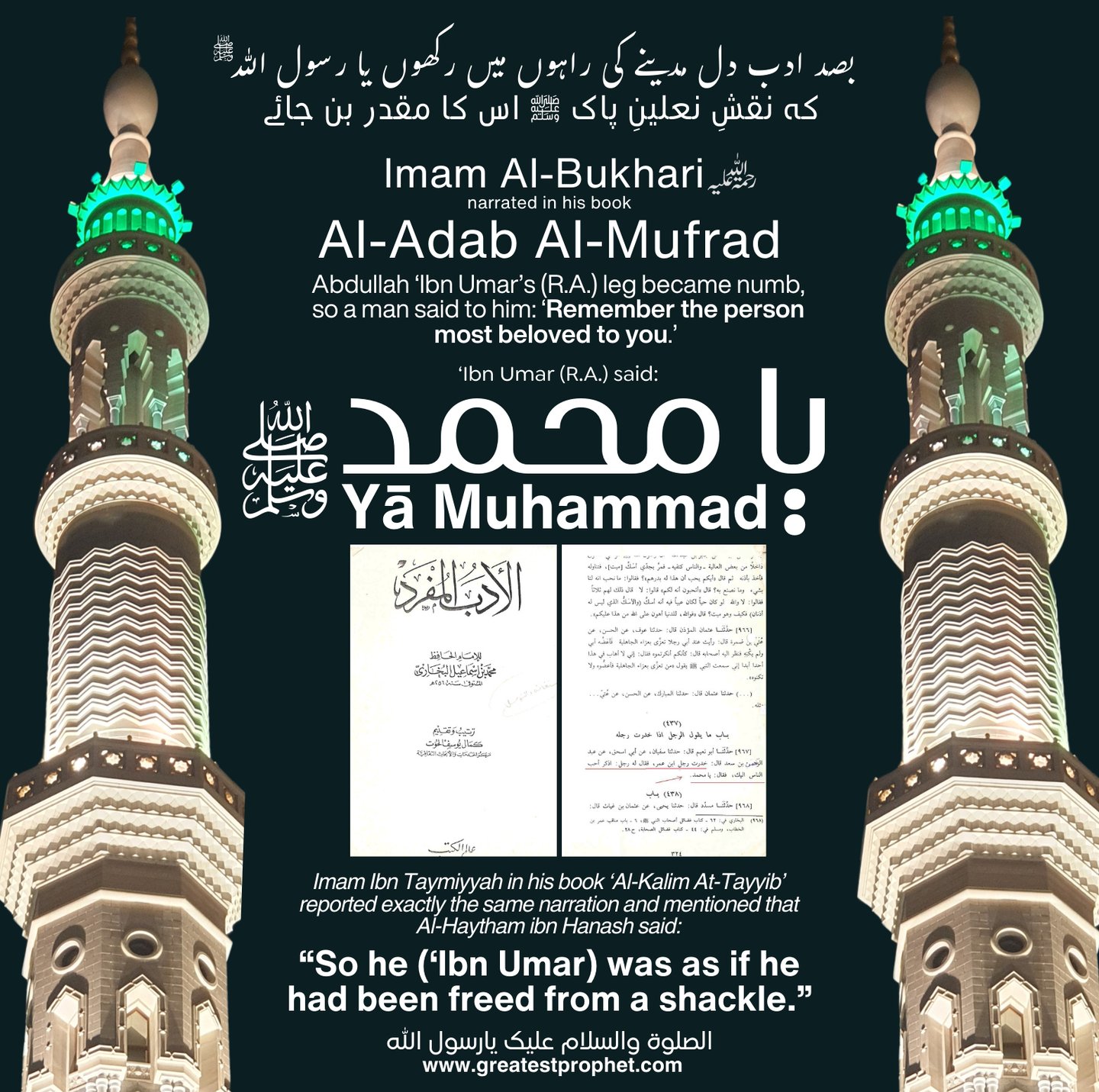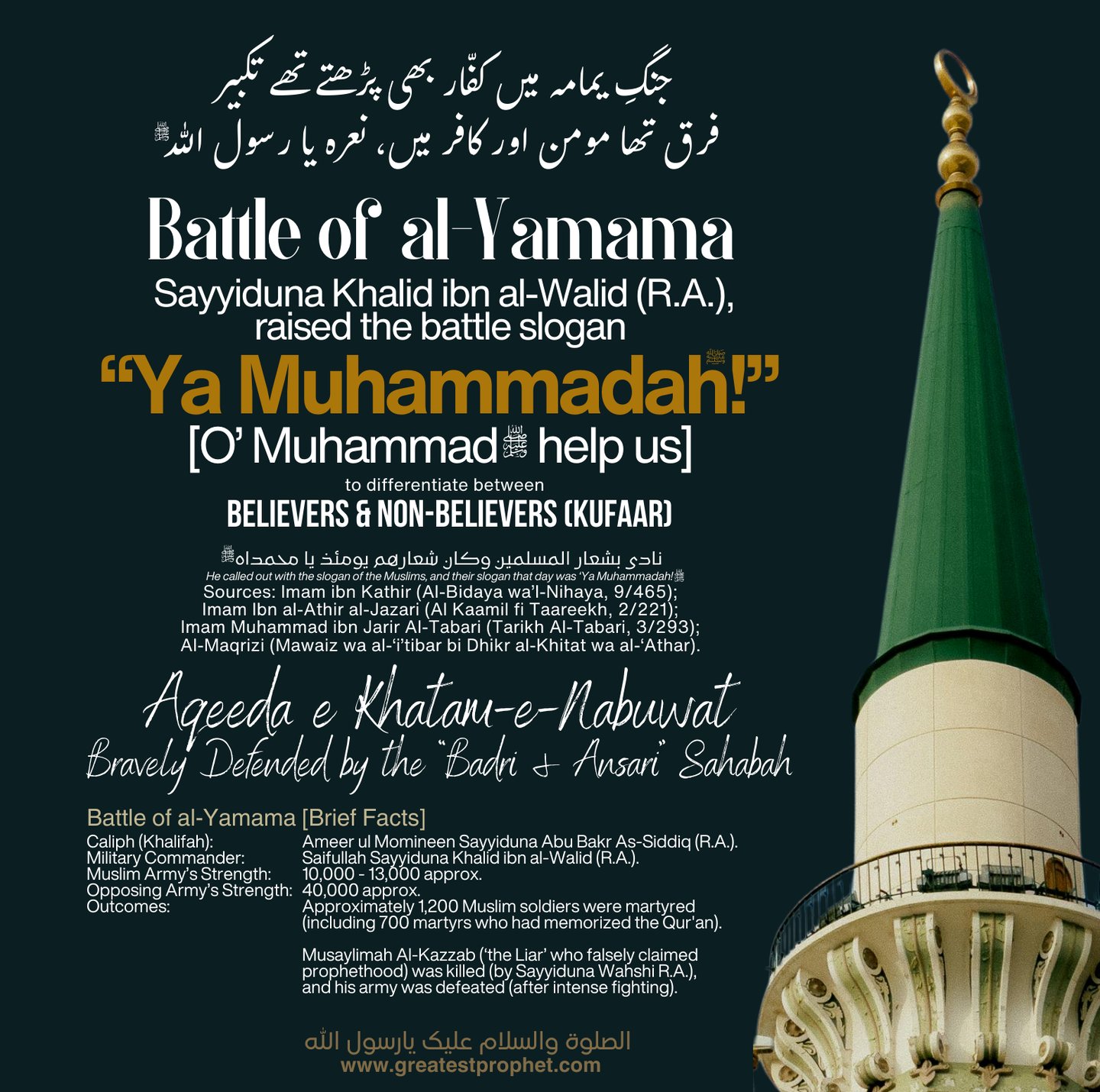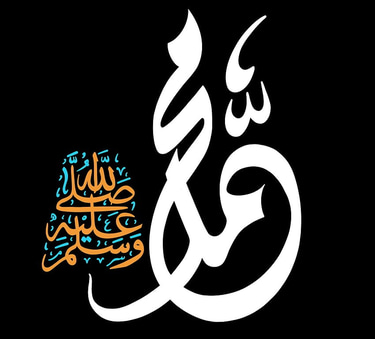Proclaiming 'Ya Rasulullah' ﷺ
To call out to the Holy Prophet صلی اللہ علیہ وسلم is permissible. Whether it is done from far or near, during his visible life or after his demise, or by one person or a congregation collectively.
PROOF OF PROCLAIMING “YA RASOOLALLAH صلی اللہ علیہ وسلم
To call out to the Prophet صلی اللہ علیہ وسلم is proven from the Holy Quran, the actions of the angels and the practice of the Sahaaba رضی اللہ تعالٰی عنہ and Ummah. The Holy Quran has called out the Holy Prophet صلی اللہ علیہ وسلم in several places, e.g. “Ya Ayuhan-Nabi,” “Ya Ayuhar-Rasool,” etc. Calling to the Prophet صلی اللہ علیہ وسلم is proven from all of these ayats. Yes. other Ambiya were called by their names, e.g. “Ya Musa علیہ السلام ,” “Ya Esa علیہ السلام ,” “Ya Yaha علیہ السلام ” etc. but our Beloved Master has been addressed with appreciative titles:
یاایھا النبی، یا ایھا الرسول، یا ایھا المزمل، یا ایھا المدثر
In fact the Holy Quran has even called out the general body of Muslims, “Ya Ayuhalazina Aamanoo,” and has ordered Muslims to call out and address the Holy Prophet صلی اللہ علیہ وسلم with cherished titles, “یاایھا الذین امنوا لا تجعلوا دعاء الرسول بینکم کدعاء بعضکم بعضا ”5.1. This ayat doesn’t disallow addressing the Holy Prophet صلی اللہ علیہ وسلم .Rather, it says that he shouldn’t be addressed like ordinary people.
The Holy Quran states “Call and address them, relating them to their fathers 5.2“This verse allows calling out to Hadrat Zaid ibn Haaritha رضی اللہ تعالٰی عنہ . However, he should not be addressed as “the son of Rasoolullah صلی اللہ علیہ وسلم “, but the son of Haaritha”. Likewise, the Kuffaar have been allowed to call their helpers for assistance “واعوا شھداء کم من دون اللہ ان کنتم صدیقین ”, 5.3.
In the first Hadith of Mishkaat Sharif, Hadrat Jibraeel علیہ السلامsubmitted “یا محمد اخبرنی عن الالسلام ”, Calling out (nidaa) is found here. At the time of the Holy Prophet’s صلی اللہ علیہ وسلم passing away, the Angel of Death علیہ السلام said, “یا محمد ان اللہ ارسلنی الیک ” Mishkaat. Baabu Wafaatin-Nabi.
Calling out is proven here as well. Hadrat Uthman ibn Haneef رضی اللہ تعالٰی عنہ reports that a hlind person came to Rasoolullah صلی اللہ علیہ وسلم and requested a dua. Sayyiduna Rasoolullah صلی اللہ علیہ وسلم instructed him to make the following supplication, “O Allah عزوجل I ask from Thee and turn towards You with the Prophet of Mercy, Muhammad صلی اللہ علیہ وسلم . Ya Muhammad صلی اللہ علیہ وسلم I have turned towards my Lord using your means in this need of mine so that it is fulfilled.
Ya Allah عزوجل Accept the intercession of Rasoolullah صلی اللہ علیہ وسلم for me.” Hadrat Abu Isbaaq رضی اللہ تعالٰی عنہ states that this Hadith is Sahib (sound).” Ibn Majah, Baabu Salaatil-Haaja.
This dua was taught to all Muslims until the Day of Qiyaamat. It proves that the permissibility of calling out, and help from the Prophet صلی اللہ علیہ وسلم was invoked in it.
Hearing distant voices and callings is absolutely not the quality of Allah عزوجل , because only he who is far from the caller hears callings from afar.
Alamghiri states, “Peace be upon you. 0 Nabi صلی اللہ علیہ وسلم ! 1 testify that are the Messenger of Allah عزوجل Kitaabul-Hajj, Adaabu ZiyaaralilQabrin-Nabi صلی اللہ علیہ وسلم .
After this, the book further states, “Salaam to Hadrat Abu Bakr Siddique رضی اللہ تعالٰی عنہ must be made by saying the following, “Peace be upon you, the true successor of Rasoolullahصلی اللہ علیہ وسلم . Peace be upon you, the Companion of the Noble Messenger in the cave.’’5.7-Ibid
It also states, “The following should be said when presenting Salaam to Hadrat Umar Farooq-e-Azam رضی اللہ تعالٰی عنہ “Peace be upon you, O Leader of the Muslims. Peace be upon you, the Illuminator of Islam. Peace be upon you, the destroyer of idols.”5.8_Ibid .
Calling out to both Rasoolullah صلی اللہ علیہ وسلم and the two Companions at his side. Hadrat Abu Bakr رضی اللہ تعالٰی عنہ and Hadrat Umar رضی اللہ تعالٰی عنہ is found in these extracts.
Superior and senior Saints (Auliya) and pious people of this Ummat used to say, “Ya Rasoolallah صلی اللہ علیہ وسلم in their supplications and religious recitals (wazifas).
Imam Busairi رضی اللہ تعالٰی عنہ writes. “O Greatest of Creation صلی اللہ علیہ وسلم ! There is none besides you for me to take refuge in at the time of difficulties.5.9– Qasida Burda.
Imam Zainul-Abideen رضی اللہ تعالٰی عنہ states in his Qasida, “Ya Rahmatulil- صلی اللہ علیہ وسلم ! Come and assist Zainul-Aabideen رضی اللہ تعالٰی عنہ because he is a prisoner at the hands or oppressors in this procession”5.10.
Maulana Jaami رضی اللہ تعالٰی عنہ states, “The life of the world is diminishing because of separation. Ya Nabi صلی اللہ علیہ وسلم Have mercy. Are you not Rahmatulil-Aalameen? Why then are we criminals distant from the attention of your mercy?”
Sayyiduna Irnam-e-Aazam Abu Hanifa رضی اللہ تعالٰی عنہ states, “O Leader of all leaders رضی اللہ تعالٰی عنہ I come to your august court with a heartfelt desire. I am hopeful of your pleasure (radaa) and hand myself over to your protection.5.12.
These extracts establish calling out to Sayyiduna Rasoolullah صلی اللہ علیہ وسلم as well as seeking assistance (istiaanat) from him. All of the above calls were made from afar and after the Holy Prophet صلی اللہ علیہ وسلم demise.
Muslims say in namaaz “السلام علیک ایھا النبی و رحمۃ اللہ و برکاتہ “Addressing the Noble Messenger صلی اللہ علیہ وسلم at this juncture is compulsory (Waajib).
Extracts from the books Shaami and Ashiatul-Lam’aat, concerning At-Tahiyaat, have already been presented in the discussion of Haazir & Naazir. Refer to them there. All of the above was in regards to calling out “Ya Rasoolallah صلی اللہ علیہ وسلم ” individually.
Many people collectively making a naraa (shout) of Risaalat (i.e. saying “Ya Rasoolallah صلی اللہ علیہ وسلم )” is also permissible because, if doing so individually is allowed, then surely nothing prohibits saying “Ya Rasoolallah صلی اللہ علیہ وسلم collectively. A few permissible things coming together cause its result and collection to be allowed. Just as how biryaani (a kind of food) is permissible because it is a collection of Halaal ingredients, so too is this also explicitly proven.
Hadrat Baraa رضی اللہ تعالٰی عنہ narrates that when the Holy Prophet صلی اللہ علیہ وسلم ” entered Madina Sharif after migrating from Makkah, men and women ascended the roofs of their homes. The children and slaves went out to the streets and began to call out, “Ya Muhammad صلی اللہ علیہ وسلم ! Ya Rasoolallah صلی اللہ علیہ وسلم Ya Muhammad صلی اللہ علیہ وسلم Ya Rasoolallah صلی اللہ علیہ وسلم ! 5.13_ Muslim, Vol. 2, Baabu Hadeethil-Hijrat.
This Hadith of Muslim Sharif proves the permissibility of making the naraa of risaalat, and we also conclude that the blessed Sahaaba used to practice it. The narration further states that the Sahaaba organized a march (juloos) to welcome the Holy Prophet صلی اللہ علیہ وسلم to Madina. Whenever the Prophet صلی اللہ علیہ وسلم returned from a journey, the residents of the city used to march to welcome him. – Mishkaat, Bukhari, etc.
“Jalse” means sitting, and “juloos” is its plural. Namaaz is the jalsa of Divine remembrance (zikr) because it occurs at only one place while Hajj is the juloos of remembrance because it occurs in many places. It is proven from the Quran that the angels brought the Ark of the Covenant (Taaboot-e-Sakina} in a march (juloos). At the time of the Holy Prophet’s صلی اللہ علیہ وسلم birth and Me’raj, angels coordinated themselves in juloos. Emulating the good is a means of reward. Hence, the march (juloos) which we hold is an emulation of these practices and a means of attaining thawaab.




